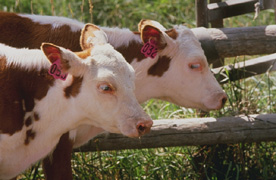This page has been archived and is being provided for reference purposes only. The page is no longer being updated, and therefore, links on the page may be invalid.
|
|
Hormone May Be Early Livestock Disease MarkerBy Sharon DurhamAugust 29, 2000 Agricultural Research Service scientists have found that a recently discovered hormone could act as an indicator of disease stress in livestock. This hormone marker could make it easier to keep some contamination out of meat processing—and save producers money. Increases in the hormone adrenomedullin (AM) appear to be associated with some forms of infection in cattle, goats, pigs and sheep, according to ARS research animal specialist Theodore H. Elsasser. He has been collaborating with a National Institutes of Health team of scientists led by Frank Cuttitta. NIH is interested in the bioactivity and function of AM in human health and disease. AM is a naturally occurring amino acid peptide hormone produced in many tissues, including adrenal medulla, lung, kidney and heart, and it is involved in many physiological and pathological processes. For example, in ARS experiments, calves that harbored internal parasites had more AM in their pancreatic tissue and blood than healthy calves. So livestock producers may be able to use a test based on higher AM levels as a screening biomarker for disease stress, indicating animals that may not be acceptable for meat processing. Both low-level, long duration parasite infections and intense, short-term bouts can provoke higher AM levels. Elsasser thinks that it may be possible to use AM levels to indicate the presence of other stresses like metabolic diseases in addition to infection, although more investigation on this application is necessary. Currently, meat processors identify questionable carcasses based on visual inspection and then subject them to microbial testing. In the future, a rapid screening test for abnormal AM levels could make it possible for the livestock producer to identify questionable animals before sending livestock to market. Monitoring of AM levels may also give livestock producers the opportunity to help sick animals recover from illness and make them safe for processing, which would be a plus for the producer and the consumer. ARS is the chief research agency of the U.S. Department of Agriculture. Scientific contact: Theodore H. Elsasser, ARS Growth Biology Laboratory, Beltsville, Md., phone (301) 504-8222, fax (301) 504-8623, elsasser@lpsi.barc.usda.gov. |


